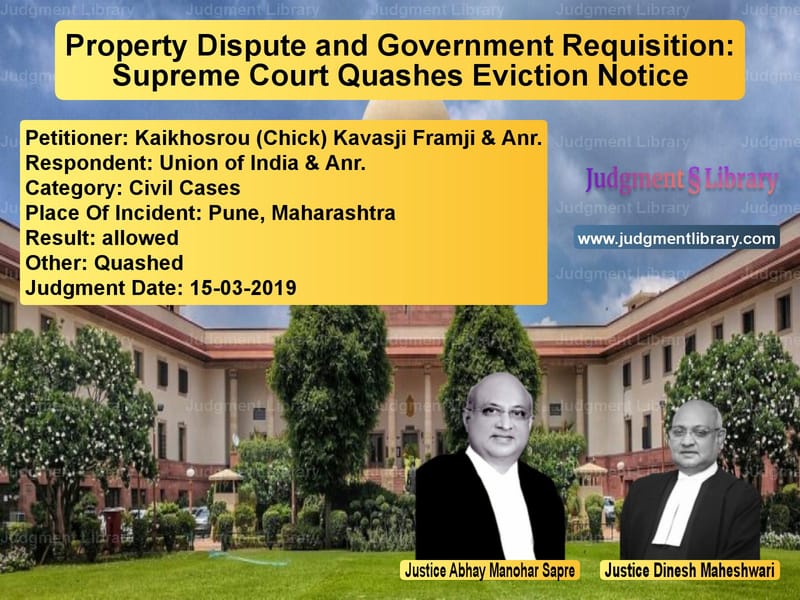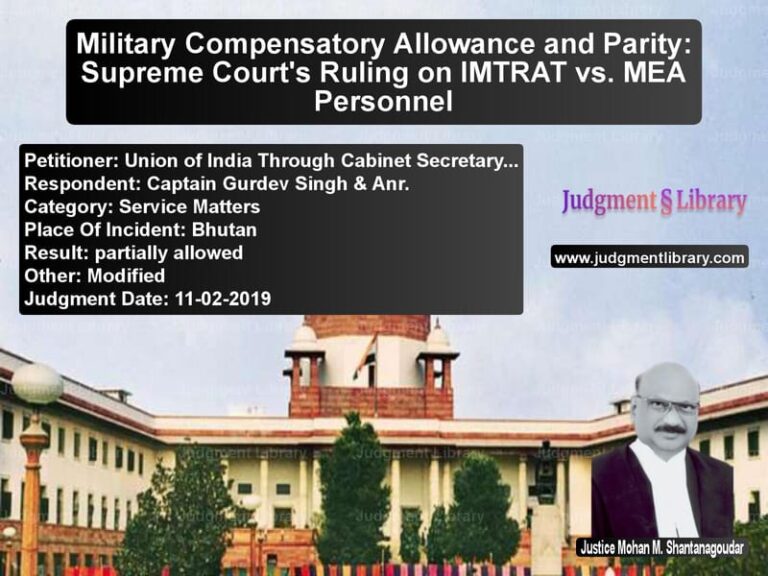Property Dispute and Government Requisition: Supreme Court Quashes Eviction Notice
The case of Kaikhosrou (Chick) Kavasji Framji & Anr. vs. Union of India & Anr. is a landmark judgment concerning property rights, government requisition, and the legal validity of eviction proceedings under the Public Premises (Eviction of Unauthorized Occupants) Act, 1971. The Supreme Court, in its judgment dated March 15, 2019, examined whether the government could evict occupants from a disputed property through summary proceedings or whether such disputes should be settled through civil suits.
The case arose from an eviction notice issued under the Public Premises Act for a property in Pune, Maharashtra. The appellants challenged the notice, claiming that they were the rightful owners and that the property was not government land. The Supreme Court, after analyzing the history of ownership and prior legal proceedings, ruled in favor of the appellants and quashed the eviction notice.
Background of the Case
The dispute involved a property located at Survey No. 417, Bungalow No. 17, Dr. Coyaji Road (formerly Elphinstone Road), Pune. The property consisted of a bungalow, cottage, outhouses, garages, and a 1.52-acre open plot.
The ownership history of the property is as follows:
- Originally owned by Burjorji Goostadji and Cooverbai Homi Karani.
- Sold to Mohammad Hajjibhoy in 1920.
- Transferred to Kaihosrou Sorabji Framji in 1923.
- Leased to the Government of India in 1929 for five years.
- Re-leased in 1940 for another five years.
- Requisitioned by the government under the Defence of India Rules in 1943.
- De-requisitioned in 1946 and returned to the Framji family.
- Requisitioned again under the Bombay Land Requisition Act, 1948.
Legal Issues Raised
- Was the property legally owned by the appellants?
- Could the government evict the occupants through summary proceedings under the Public Premises Act?
- Did previous court rulings establish the ownership rights of the appellants?
- Was a civil suit necessary to resolve the dispute?
Arguments by the Petitioner (Kaikhosrou Kavasji Framji & Anr.)
The appellants argued:
- The property was privately owned and not government land.
- The Bombay High Court had previously ruled in favor of their ownership.
- The government had wrongly classified the land under “Old Grant” terms, allowing it to resume ownership.
- The eviction notice violated the principles of natural justice.
Arguments by the Respondent (Union of India)
The government contended:
- The property was originally granted to the owners under the Old Grant system, allowing the government to reclaim it.
- The appellants were unauthorized occupants under the Public Premises Act.
- The eviction notice was valid and followed proper legal procedures.
- The appellants had no legal claim to the property.
Supreme Court’s Judgment
The Supreme Court ruled in favor of the appellants, holding:
- The property had been owned privately since the 1920s.
- The government had failed to prove its ownership over the land.
- The Public Premises Act could not be used to settle complex ownership disputes.
- The appropriate course of action for the government was to file a civil suit.
The Court observed:
“A bona fide dispute exists regarding the ownership of the suit property. The appropriate remedy is a civil suit, not summary eviction under the Public Premises Act.”
Key Takeaways from the Judgment
- Ownership disputes must be resolved through civil suits, not summary eviction proceedings.
- The government cannot use the Public Premises Act to evict occupants from privately owned land.
- Prior judicial rulings must be considered before initiating eviction proceedings.
- The principle of natural justice requires that complex property disputes be settled through proper legal channels.
Conclusion
The Supreme Court’s ruling in Kaikhosrou (Chick) Kavasji Framji & Anr. vs. Union of India & Anr. is a significant victory for property owners facing government requisition and eviction notices. The judgment upholds the principle that ownership disputes cannot be settled through summary proceedings but must be resolved through civil suits. It also reinforces the importance of due process and fair treatment in property disputes.
Petitioner Name: Kaikhosrou (Chick) Kavasji Framji & Anr..Respondent Name: Union of India & Anr..Judgment By: Justice Abhay Manohar Sapre, Justice Dinesh Maheshwari.Place Of Incident: Pune, Maharashtra.Judgment Date: 15-03-2019.
Don’t miss out on the full details! Download the complete judgment in PDF format below and gain valuable insights instantly!
Download Judgment: Kaikhosrou (Chick) K vs Union of India & Anr Supreme Court of India Judgment Dated 15-03-2019.pdf
Direct Downlaod Judgment: Direct downlaod this Judgment
See all petitions in Property Disputes
See all petitions in Landlord-Tenant Disputes
See all petitions in Judgment by Abhay Manohar Sapre
See all petitions in Judgment by Dinesh Maheshwari
See all petitions in allowed
See all petitions in Quashed
See all petitions in supreme court of India judgments March 2019
See all petitions in 2019 judgments
See all posts in Civil Cases Category
See all allowed petitions in Civil Cases Category
See all Dismissed petitions in Civil Cases Category
See all partially allowed petitions in Civil Cases Category







